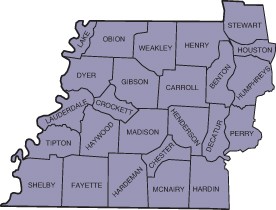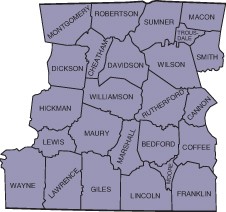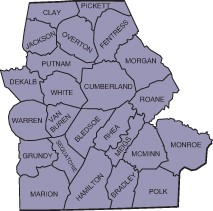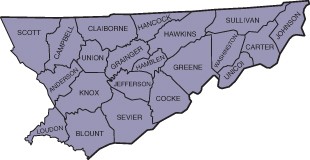Public Land Duck Hunting
Duck Hunting In Tennessee
For many years Tennessee Wildlife Resources Agency received public comments about public land duck hunting. The comments mostly fell into 2 categories: the need for increased duck hunting opportunities on public lands (i.e. more access) and concerns over the fairness of the handheld duck blind draw system. A scientific survey of duck hunters done in partnership with the University of Tennessee validated these comments, as well as other issues with in-person handheld draws, and a desire for opportunities to hunt for shorter time periods.
In 2020, due to COVID, all handheld duck blind drawings were computerized and available online, to ensure the waterfowl quota hunt season could continue. The Agency decided to maintain this system to make Waterfowl hunting consistent with all other agency quota hunts and to provide fair and equitable access to all hunters across the state.
In 2021, TWRA took another step with the creation of the Tier segmented hunt options. In addition to season-long 60-day sites, other Tiers provide 2 to 4-day hunts during the early, mid, and late duck season. This dramatically increased the number of duck hunters who can be drawn and have public access to WMAs each season. To find season dates and read more about waterfowl hunting take a look at our Waterfowl page.
Youths, ages 6–16, must be accompanied by an adult, 18 years of age or older, who must remain in a position to take immediate control of the hunting device except as otherwise noted.
Veterans and members of the Armed Forces on active duty, including members of the National Guard and Reserves on active duty (other than for training) can participate in the special Veterans and Active Military Personnel Waterfowl Season on WMAs.
General Information
Tier Designation System Definition
A designated waterfowl hunt location is a marked location (via physical stake or Global Positioning System [GPS] coordinates) established by the TWRA upon which a permanent blind may be constructed, depending on Tier designation as determined by TWRA, at Barkley Unit I, Big Sandy (including Gin Creek Unit), Camden Units I and II, Cheatham Lake, Gooch Unit A, Haynes Bottom, Old Hickory Units I and II, Tigrett, AEDC (Woods Reservoir), West Sandy, and Reelfoot.
• Tier 1 designated hunt location is a marked location with a permanent blind assigned by a random drawing to a permittee for an entire waterfowl hunting season.
• Tier 2 designated hunt location is a marked location with a TWRA constructed and maintained permanent blind assigned by a random drawing to a permittee for a period of time during the waterfowl hunting season.
• Tier 4 designated hunt location is a marked location that may be hunted on a first-come, first-served basis.
Blind Hopping
A waterfowl hunt permittee, an individual to whom the TWRA issued a permit for Tier 1 blinds, must occupy his/her blind or hunt location by the legal daily opening shooting time on days he/she wishes to hunt, and if the blind or hunt location is unoccupied at that time by the permittee, the first person or party occupying the blind ("blind hopper") shall be entitled to the privilege of its exclusive and uninterrupted use until the end of shooting hours that day. Exclusive and uninterrupted use entitles the person or party the right to exclude all others from the blind or hunt location at the person’s or party’s option, except for law enforcement personnel engaged in the performance of their duties. The permittee has priority use (exclusive and uninterrupted) only if he/she is at the blind or hunt location on or before the legal daily opening shooting time, even if the blind or hunt location is occupied by another person or party, provided the permittee produces identification and his/her permit.
The “blind hopping” allowance does not apply to Tier 2 blinds.
Temporary Hunt Locations
Hunting will be permitted from permanent draw blinds and temporary blinds on Camden-Unit II, Big Sandy (including Gin Creek Unit), Barkley Unit II, Cordell Hull, Reelfoot, Tigrett, and West Sandy in accordance with statewide rules and regulations. Any temporary blinds and decoys must be at least two hundred (200) yards from any Tier 1, 2, or 4 waterfowl hunt locations blind and must be removed from the area at the end of shooting each day.
Wheelchair-bound Bind Sites
Certain WMAs have special blind sites established for wheelchair-bound hunters which include: Camden, Cheatham Lake, North Chickamauga Creek, Old Hickory Unit !, Reelfoot, and West Sandy. Find out more information on our Migratory Bird main page.
- Tier 1 permits will be valid for the entire regular waterfowl season.
- Tier 1 Locations shall have a permanent blind at the location built or maintained (if a permanent blind already exists) at the location, by the permittee(s).
- The maximum hunt party size for Tier 1 Locations is eight (8) adults, but there is no maximum party size for youth hunters. However, youth hunters (ages 6–15) must be accompanied by an adult at least eighteen (18) years of age while hunting a Tier 1 Location.
- All Tier 1 Location permanent blind construction and/or placement must be complete by the fourth Monday in October. To be considered complete, a permanent blind structure must be at least four (4) feet wide, four (4) feet high, and eight (8) feet long, but may not exceed thirty (30) feet in length and may not exceed three hundred (300) total square feet. The walls of the permanent blind structure must be solid material to which camouflage may be attached. A permanent blind structure at a Tier 1 Location must be in place and remain in place throughout the regular waterfowl season. All camouflage must be completed by opening day of regular waterfowl season.
- Any Tier 1 Location with a permanent blind structure not in compliance with the above requirements will result in the Tier 1 Location Permit being cancelled and the Tier 1 Location being designated as a Tier 4 Location for the remainder of the waterfowl season. Tier 1 Locations redesignated as Tier 4 Locations may be drawn as Tier 1 Locations the following year.
- If adverse environmental conditions prevent the construction and/or placement of a permanent blind at the site by the deadline, as determined by the TWRA, the area manager may grant an extension. The area manager must receive a written request for an extension, from a permittee, prior to the fourth Monday in October. Should these adverse environmental conditions persist and completely prevent the construction and/or placement of a blind on the site, as verified by the area manager, a permittee shall not be denied the opportunity to participate in the drawing the following year. Blinds rendered unusable or destroyed may be repaired or replaced at the discretion of the area manager.
- Permanent blinds built on Tier 1 Locations must be within five (5) feet of designated stakes or GPS coordinates.
- Permittee(s) must remove all associated blind materials, including all litter and trash, stakes, weights, and lines within fifteen (15) days after the last day of the regular waterfowl season or the last day of a special youth or military hunt, which ever occurs later. All blinds must be removed from Tier 1 locations by April 30, but an area manager may allow more time for removal upon written request. Any blind not removed will become the property of the TWRA for future use and/or destruction. If a Tier 1 Location permittee does not meet the deadline for having the blind on site, or violates any other provision of this rule, the permittee forfeits the permittee’s opportunity to participate in any waterfowl quota hunt drawing the following year.
- Successful applicants drawn for a Tier 1 Location are prohibited from applying, as an individual or in a party, for a Tier 2 and other pool/site locations.
- Tier 2 permits will be valid for a 1-4 day hunt period.
- Tier 2 Locations shall have a permanent blind at the location built and maintained by the TWRA.
- The maximum hunt party size for Tier 2 Locations is eight (8) adults, but there is no maximum party size for youth hunters. However, youth hunters must be accompanied by an adult at least eighteen (18) years of age while hunting a Tier 2 Location.
- A Tier 2 Location permittee must be present any time a Tier 2 Location is hunted. No other individual may hunt a Tier 2 Location even if a permittee is not in the blind by the legal daily opening shooting time.
- No access is allowed until 4:00 a.m. on the day of the drawn hunt. Permittee(s) are responsible for removal of all decoys, litter, and trash on the last day of the hunt period.
Application period: Hunters can apply for Tier 2 Sites through any TWRA license agent or at GoOutdoorsTennessee.com during three (3) separate application periods (Early Segment Sept. 24–Oct. 14, 2025; Mid Segment Oct. 22–Nov. 12, 2025; Late Segment Nov. 13–Dec. 3, 2025). All waterfowl drawings require a party application of 4 persons minimum, 8 person maximum.
- Tier 4 Locations may or may not have permanent blinds.
- Any permanent blinds at Tier 4 Locations are structures left over from Tier 1 Sites that have become Tier 4 Locations because the successful applicant failed to construct a blind by the deadline.
- No person may construct new permanent blind structures at Tier 4 Locations.
- Temporary blinds may be used at Tier 4 Locations, but the blinds must be removed at the end of each day.
- Any temporary blinds and decoys must be removed from the area at the end of shooting each day.
- All temporary blinds must be within twenty-five (25) feet of designated stakes or GPS coordinates.
- No permit is required to hunt Tier 4 Locations, but the first person or party to the location before the legal daily opening shooting time has priority use (exclusive and uninterrupted use) of the location until the end of the shooting hours that day. Exclusive and uninterrupted use entitles the person or party to the right to exclude all others from the location, at the person’s or party’s option, except for law enforcement personnel engaged in the performance of their duties.
- The maximum hunt party size for Tier 4 Locations is eight (8) adults, but there is no maximum party size for youth hunters. However, youth hunters must be accompanied by an adult at least eighteen (18) years of age while hunting a Tier 4 Location.
- Any person or party hunting a Tier 4 Location is responsible for removal of all decoys, litter, and trash at the end of each day.
WMA Tier Designations Summary Chart
All waterfowl drawings require a party application of 4 persons minimum, 8 persons maximum.
|
TIER 1 |
TIER 2 |
TIER 4 |
QUOTA PERMIT AREA |
|---|---|---|---|---|
Blind Type |
Permanent Blind built and maintained by permit holder(s). |
Permanent Blind built and maintained by TWRA. |
Temporary blinds only* |
Temporary blinds only. |
Permit duration |
Entire regular waterfowl season 60 days. |
1-4 day hunt period. Closure days on specific WMAs may apply. |
No permit needed, first come, first-served. |
1-4 day hunt period. Closure days on specific WMAs may apply. |
Hunt Location Permit Required |
Yes |
Yes |
No |
Yes |
Application Deadlines Minimum of 4 people, maximum of 8. |
Opens - June 25, 2025 Closes - July 16, 2025 Claim permit by August 11, 2025. |
Early Segment Opens - Sept. 24, 2025 |
First come-First Served. |
Early Segment Opens - Sept. 24, 2025 |
Mid Segment Opens - Oct. 22, 2025 |
Mid Segment Opens - Oct. 22, 2025 |
|||
Late Segment Opens - Nov. 13, 2025 |
Late Segment Opens - Nov. 13, 2025 |
|||
Equipment Removal (Decoys, trash, blind material) |
15 days post season. |
End of Hunt period. |
Daily |
End of Hunt period. |
Youth/Military Hunt |
Available to permit holders/ hopping. |
Apply during Late segment. |
First-come, first-served. |
Apply during Late segment. Chickamauga Units open on a first-come, first-served basis. |
Hopping |
Yes |
No |
Yes, first-come, first-served. |
No |
Hunting Distance from Stake |
Blinds Constructed within 5 ft. of location. |
Must be in blind. |
25 ft. |
Must be in designated unit. |
Left-Over Drawing |
Yes, after claim permit deadline; No, after blind construction deadline. |
Yes |
N/A |
Yes |
Post Season Survey |
Yes |
Yes |
No |
Yes |
Priority Points |
No |
Yes |
No |
Yes |
Blind Construction Deadline |
Fourth Monday in October. |
N/A |
N/A |
N/A |
| Number of Hunters | Max 8 adults, No limit for youth hunters. | Max 8 hunters, no limit for youth hunters, must include permit holder. | Max 8 adults, no limit for youth hunters. | Max 8 hunters, must include permit holder |
| *except where there is a blind remaining from the previous season. No new blinds may be constructed. | ||||
| Tier 1 sites forfeited during the permitting process will be available for reallocation at the respective regional office on August 22, 2024, at 9:00 am. In-person attendance required. | ||||
WMAs known for waterfowl hunting are primarily made up of low elevation wetlands. This type of land is prone to flooding and provides both land and aquatic habitat for waterfowl and other wildlife species. TWRA works to provide diverse habitats for wildlife by managing for moist soil plants and planting traditional grain crops like corn and millet. However, because these areas are wetlands, crop production will not be comparable to production agriculture seen on neighboring higher elevation farms.
WMA managers will provide flooding and crop condition updates as they become available.
Last updated July 1, 2025
In order for the agency to understand the quality of your duck hunting experience and how we can better serve you, a post-season survey is sent to everyone who receives a permit for a blind. Surveys will be sent in late January and early February. The survey must be completed by February 28, even if you did not hunt.
Duck Hunting In Tennessee Background
For many years Tennessee Wildlife Resources Agency received public comments about public land duck hunting. The comments mostly fell into 2 categories: the need for increased duck hunting opportunities on public lands (i.e. more access) and concerns over the fairness of the handheld duck blind draw system. A scientific survey of duck hunters done in partnership with the University of Tennessee validated these comments, as well as other issues with in-person handheld draws, and a desire for opportunities to hunt for shorter time periods.
In 2020, due to COVID, all handheld duck blind drawings were computerized and available online, to ensure the waterfowl quota hunt season could continue. The Agency decided to maintain this system to make Waterfowl hunting consistent with all other agency quota hunts and to provide fair and equitable access to all hunters across the state.
In 2021, TWRA took another step with the creation of the Tier 2 segmented hunt options. In addition to season-long 60-day sites, Tier 2 sites provide 2, 3, or 4-day hunts during the early, mid, and late duck season. This dramatically increased the number of duck hunters who can be drawn and have public access to WMAs each season.



